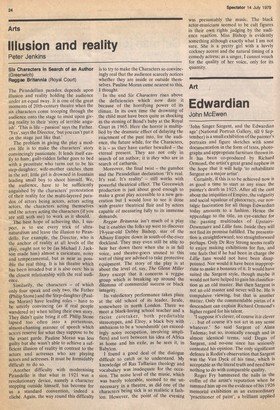Illusion and reality
Peter Jenkins
Six Characters in Search of an Author (Greenwich)
Reggae Britannia (Royal Court) The Pirandellian paradox depends upon illusion and reality holding the audience under an equal sway. It is one of the great moments of 20th-century theatre when the six characters come trooping through the audience onto the stage to insist upon giving reality to their 'story of terrible anguish'. 'This is life — passion' says the Father. 'Yes', says the Director, 'but you can't put it on the stage just like that.'
The problem in giving the play a modern life is to make the characters' story convincingly passionate. It lends itself easily to ham; guilt-ridden father goes to bed with a prostitute who turns out to be his step-daughter; wife-mother catches, them in the act; little girl is drowned in fountain leading small boy to shoot himself. We, the audience, have to be sufficiently anguished by the characters' protestation of their reality for the multi-layered paradox of actors being actors, actors acting actors, the characters acting themselves and the actors acting the characters (if you are still with me) to work as it should.
The best• hope of achieving this, I suspect, is to use every trick of ultranaturalism and leave the illusion to Pirandello. For example, the Director, who is the anchor of reality at all levels of the play, ought not to be (as Michael J. Jackson made him) almost a caricature, noisy and temperamental, but as near as possible the real thing. It is his theatre which has been invaded but it is also ours: his is the closest relationship with the real audience.
Similarity, the characters — of which only four speak and only two, the Father (Philip Stone) and the Step-daughter (Pauline Moran) have leading roles — have to be utterly convincing (as if real people wandered in) when telling their own story. They didn't quite bring it off. Philip Stone lapsed too often into a portentous, almost-chanting manner of speech which actors reserve for what they suppose to be the avant garde. Pauline Moran was less guilty but she wasn't able to achieve a sufficient illusion of reality in contrast to the actors and actresses who are playing actors and actresses. It must be formidably difficult to do so.
Another difficulty with modernising Pirandello is that what in 1921 was a revolutionary device, namely a character stepping outside himself, has become for us a standard convention, indeed a cliché. Again, the way round this difficulty is to try to make the Characters so convincingly real that the audience scarcely notices whether they are inside or outside themselves. Pauline Moran came nearest to this, I thought.
In the end Six Characters rises above the deficiencies which now date it because of the horrifying power of its climax. In its own time the drowning of the child must have been quite as shocking as the stoning of Bond's baby at the Royal Court in 1965. Here the horror is multiplied by the dramatic effect of delaying the enactment of the past into, for the audience, the future while, for the Characters, it is — as they have earlier bewailed — the eternal present. They are not only in search of an author; it is they who are in search of catharsis.
Moreover, the final twist — the gunshot and the Pirandellian declaration 'It's real. It's real. It's reality' — still works with powerful theatrical effect. The Greenwich production is just about good enough to make a great play accessible to a new generation but I would love to see it done with greater theatrical flair and by actors capable of measuring fully to its immense demands.
Reggae Britannia isn't much of a play but it enables the folks up west to discover 19-year-old Debby Bishop, star of the Albany Empire down in south-of-the-river dockland. They may even still be able to hear her down there when she is in full voice, and theatre-goers unused to this sort of thing are advised to take protective equipment. The story of the play is at about the level of, say, The Glenn Miller Story except that it concerns a reggae group which is breaking up around the dilemma of commercial success or black integrity.
Its valedictory performance takes place at the old school of its leader, Israle, somewhere in north London. There we meet a black-loving school teacher and a racist caretaker, both predictable stereotypes, and Elroy, a black boy with ambitions to be a `soundsmith' (an exceedingly noisy occupation, involving amplifiers) and torn between his idea of Africa as home and his exile, as he sees it, in Babylon. I found a good deal of the dialogue difficult to catch or to understand. My knowledge of Ras Taffarian theology and vocabulary was inadequate for the occasion. The noise level of the music, which was barely tolerable, seemed to me unnecessary in a theatre, as did one of the characters being sick is so realistic a fashion. However, the point of the evening was presumably the music. The black actor-musicians seemed to be cult figures in their own rights judging by the audience reaction. Miss Bishop is evidently something although exactly what I am not sure. She is a pretty girl with a luvvly cockney accent and the natural timing of a comedy actress; as a singer, I cannot vouch for the quality of her voice, only for its quantity.


































 Previous page
Previous page